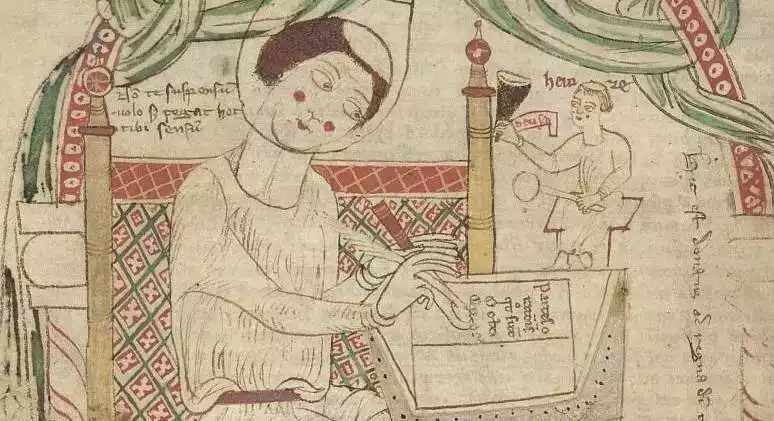
Sedulius Scottus, a distinguished figure of the Carolingian Renaissance, made significant contributions to the cultural and intellectual landscape of the 9th century. Born in Ireland, his exact date of birth remains uncertain, although it is believed he flourished around the mid-9th century. His death is also not precisely recorded, but he is thought to have passed away in the latter part of the 9th century. As a teacher, scholar, and poet, Sedulius Scottus’s impact on the revival of classical learning in the Carolingian era was profound, leaving a lasting legacy in the realms of theology, poetry, and education.
Early Life and Education
Sedulius Scottus’s journey began in Ireland, an island renowned for its monastic scholarship and learning. The precise details of his early life are shrouded in the mists of history. However, it is known that he received a comprehensive education in the rich intellectual tradition of the Irish monastic schools. These institutions were bastions of learning, preserving and advancing knowledge in a Europe still emerging from the shadows of the Dark Ages.
His education would have encompassed a wide array of subjects, including theology, philosophy, Latin literature, and possibly Greek. This broad educational foundation not only equipped Sedulius with extensive knowledge but also with a versatile intellectual toolkit. It fostered in him a deep appreciation for the classical texts, an element that later became a hallmark of his scholarly and poetic works.
The Ireland of Sedulius’s time was a hub for scholars and a beacon of learning in a Europe that was intellectually fragmented. The monastic schools were not just centers of learning but also of cultural exchange, where the preservation of knowledge was considered a sacred duty. It is within this context that Sedulius’s intellectual prowess was nurtured, laying the groundwork for his subsequent contributions to the Carolingian Renaissance.
Journey to the Continent and Carolingian Influence
The Irish scholar Sedulius Scottus, drawn by the revitalized learning of the Carolingian Renaissance, crossed the sea to Francia in the 9th century. This revival of letters under Charlemagne and his successors aimed to recapture classical glory. Sedulius integrated with continental intellectual circles, his Irish background proving valuable amid vibrant discussion. He engaged scholars, contributing insights from the island’s monastic tradition.
Sedulius arrived as the court strived to establish itself as a new Rome. This environment, fusing varied traditions, proved fertile ground for scholars. Sedulius became a bridge between Irish and continental thought, his presence enriching the distinctive synthesis of the age.
Sedulius’s Carolingian tenure saw prolific literary and scholarly output. His erudite, eloquent writings spanned poetry, commentary, and didactic treatise. Blending classical form with Christian theme, his poetic style married the secular and sacred. These verses conveyed complex ideas, emblematic of cultural currents. His scriptural commentaries and theological works also significantly contributed. Marked by nuanced exegesis and rhetorical sophistication, these informed theological education then and later.
Legacy and Influence
The legacy of Sedulius Scottus extends far beyond his lifetime. His works continued to be read and studied throughout the Middle Ages, serving as a bridge between the intellectual traditions of Ireland and the continent. His influence can be seen in the way he helped to shape the curriculum of the Carolingian schools, which became centers of learning and intellectual exchange.
Sedulius’s contributions to the Carolingian Renaissance played a pivotal role in the preservation and transmission of classical knowledge. He was part of a broader movement that sought to integrate Christian and classical learning, a synthesis that had a lasting impact on the intellectual history of Europe.
His works continue to be of interest to scholars today, not only for their historical significance but also for their literary and theological insights. Sedulius Scottus remains an emblematic figure of a period that laid the foundations for the intellectual developments of the High Middle Ages and beyond.
Sedulius Scottus, through his scholarship, poetry, and teaching, emerged as a key figure in the Carolingian Renaissance, contributing significantly to the cultural and intellectual revival of the era. His work represents a unique synthesis of Irish monastic tradition and classical learning, reflecting the dynamic interchange of ideas that characterized this period. His legacy continues to inform our understanding of the intellectual history of the Early Middle Ages, underscoring the enduring importance of his contributions to European culture and scholarship.
References
- JSTOR Stable (Accessed 16 Dec 2023).
- University of Michigan – Classics Tools (Accessed 16 Dec 2023).
- Brown, Peter. “The Rise of Western Christendom.” Wiley-Blackwell, 2012.
- Irish Philosophy on Sedulius Scottus (Accessed 16 Dec 2023).
- Zimmermann, Albert. “The Carolingian Renaissance: Heritage and Innovation.” De Gruyter, 2016.
